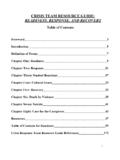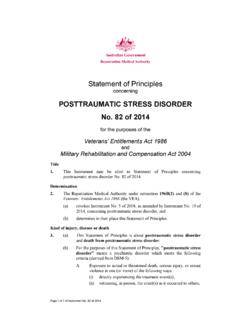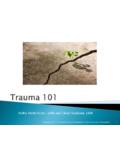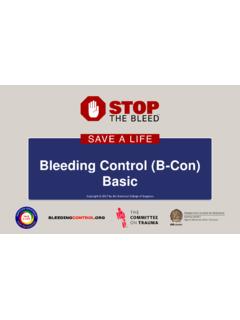Transcription of FINAL CLINICAL STUDY REPORT
1 MAPS CLINICAL STUDY REPORT MP-2 15-SEP-2011 Page 1 of 62 FINAL CLINICAL STUDY REPORT Protocol #: MP- 2 IND #: 63,384 September 15, 2011 First Subject First Visit: July 18, 2006 Last Subject Last Visit: January 10, 2011 Phase Two Pilot STUDY : 3,4-methylenedioxymethamphetamine (MDMA)-assisted Psychotherapy in Patients with Treatment-resistant Posttraumatic Stress Disorder (PTSD) A randomized, single-center, active placebo-controlled, double-blind, partial crossover STUDY comparing response to psychotherapy assisted by 25mg or 125 mg MDMA. A STUDY performed in accordance with the principles of Good CLINICAL Practice as described in International Conference of Harmonization guidelines, including the archiving of essential documents.
2 SPONSOR Multidisciplinary Association for Psychedelic Studies (MAPS) 309 Cedar Street, #2323 Santa Cruz, CA 95060 SPONSOR DESIGNEE Rick Doblin, Phone number: +1-617-484-8711 Fax number: +1-831-429-6370 PRINCIPAL INVESTIGATOR Dr. med. Peter Oehen Phone number: +41-032-672-0606 Fax number: +41-032-672-0605 STUDY SITE Ulmenweg 24a 4562 Biberist Switzerland MAPS CLINICAL STUDY REPORT MP-2 15-SEP-2011 Page 2 of 62 SYNOPSIS Name of Sponsor: Multidisciplinary Association for Psychedelic Studies (MAPS) Name of Investigational Product: 3,4-methylenedioxymethamphetamine (MDMA) Name of Active Ingredient: 3,4-methylenedioxymethamphetamine (MDMA) Title of STUDY : MDMA-Assisted Psychotherapy in Patients with Treatment-resistant Posttraumatic Stress Disorder (PTSD) Protocol Number: MP-2 Investigators: Dr.
3 Med. Peter Oehen (Principal Investigator), Verena Widmer (Co-investigator), Dr. med. Rafael Traber (Independent Rater) STUDY Center: Ulmenweg 24a, 4562 Biberist, Switzerland Publication (reference): In preparation STUDY Period: First Subject First Visit: July 18, 2006 Last Subject Last Visit: January 10, 2011 Phase of Development: Phase 2 Objectives: The primary objective of this STUDY was to evaluate changes in PTSD symptoms via CAPS scores gathered at baseline, three weeks after the second experimental session, and three weeks after the third experimental session. The following main questions were explored in this STUDY : Can MDMA, in the doses to be used in this STUDY , be safely administered in the population of treatment-resistant PTSD subjects without any serious adverse events?
4 Will subjects receiving the larger, full dose of MDMA, in combination with non-drug assisted psychotherapy, demonstrate greater symptomatic improvement than subjects given an active placebo dose of MDMA in combination with non-drug psychotherapy? Will subjects receiving three MDMA sessions, in combination with non-drug psychotherapy, demonstrate an additional improvement compared to subjects receiving only two sessions? Can treatment effects of MDMA-assisted psychotherapy be maintained beyond end of treatment? Secondary Objectives: To evaluate changes in PTSD symptoms as assessed via PDS at baseline, the day after each experimental session, and three weeks after the third experimental session.
5 To evaluate PTSD symptoms measured by CAPS and PDS scores three weeks after the second Stage 2 experimental session, three weeks after the third Stage 2 experimental session and two months after the third Stage 2 experimental session. To formally or informally evaluate CAPS scores in participants who underwent an optional open label continuation for treatment non-responders (Stage 3). To evaluate changes in PTSD symptoms assessed via CAPS and PDS scores obtained two, six and twelve months after the third experimental session. Safety Objectives: To assess blood pressure and pulse during experimental sessions using automated blood pressure and pulse monitoring equipment.
6 To assess body temperature at regular intervals during experimental sessions. To assess experience of degree of psychological distress by repeated administration of the SUD during experimental sessions. MAPS CLINICAL STUDY REPORT MP-2 15-SEP-2011 Page 3 of 62 Name of Sponsor: Multidisciplinary Association for Psychedelic Studies (MAPS) Name of Investigational Product: 3,4-methylenedioxymethamphetamine (MDMA) Name of Active Ingredient: 3,4-methylenedioxymethamphetamine (MDMA) Methodology: The STUDY followed a randomized, active placebo-controlled, double-blind design, with subjects, psychotherapists, and independent raters blinded to participant condition.
7 Twelve subjects with treatment-resistant PTSD were randomly assigned after baseline assessment to receive either a full dose of 125 mg MDMA followed by a supplemental dose of mg MDMA administered 2 to hours later, or to receive an active placebo dose of 25 mg MDMA followed by mg MDMA 2 to hours later. Subjects underwent three sessions of MDMA-assisted psychotherapy scheduled to occur three to five weeks apart, one non-drug-psychotherapy session twenty four hours after each MDMA session, and two to four weekly integrative psychotherapy sessions after each MDMA session. PTSD symptoms were assessed by an independent rater once prior to MDMA-assisted psychotherapy, then three weeks after the second MDMA-assisted session and three weeks after the third experimental session.
8 After unblinding, active placebo subjects had the opportunity to take part in an open-label continuation of the STUDY , referred to as Stage 2. Outcome measures were administered three weeks after the second and third experimental session. Outcome measures were also scheduled two, six, and twelve months after the FINAL experimental session as a follow-up. Subjects receiving the full dose in either Stage 1 or Stage 2 who did not show significant improvement in PTSD symptoms were offered the opportunity to take part in an open-label continuation of the STUDY , Stage 3, consisting of two additional MDMA sessions with either 125 or 150mg MDMA.
9 Number of Subjects (planned and analyzed): 12 subjects planned; 14 subjects enrolled; 2 subjects dropped; 12 subjects completed and analyzed Diagnosis and Main Criteria for Inclusion and Exclusion: Participants who meet the following criteria would be considered for inclusion in this STUDY : 1. Participants must meet DSM IV criteria for current PTSD (within the past 6 months) in response to a traumatic experience. An individual would not be excluded if she or he experienced more than one traumatic event. Participants must have a CAPS score of 50 or higher, indicating moderate to severe PTSD symptoms. 2. They must have had at least one unsuccessful attempt at treatment for PTSD.
10 Treatments include psychotherapy and pharmacotherapy. Pharmacotherapies may include selective serotonin uptake inhibitors (SSRIs). Psychotherapeutic treatments may include, but are not limited to cognitive-behavioral therapy (including exposure therapy), stress inoculation training, including anxiety management, and insight-oriented psychotherapy. Treatment would be deemed unsuccessful if the participant continues to meet criteria for current PTSD following the treatment. 3. Participants may also meet criteria for a mood disorder (except bipolar affective disorder, see exclusions) and for other anxiety disorders. The inclusion of people with other mood and anxiety disorders is essential because recent literature indicates the marked frequency of the co-existence of other psychiatric disorders among patients with PTSD.








